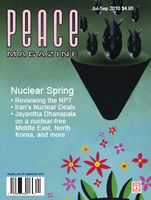
Peace Magazine Jul-Sep 2010, page 31. Some rights reserved.
Search for other articles by peacemag here
The first review conference of the Rome Statute—the International Criminal Court—met in Uganda. On the final day, June 11, the member states amended the Statute to expand its jurisdiction to the Crime of Aggression. After years of debate the Crime of Aggression was defined, as were the conditions by which the court can exercise partial jurisdiction. This amendment gave victory to NGOs who had lobbied the 111 ICC member states.
The ICC brings to trial individuals who had committed the most serious crimes of concern to the international community: genocide, crimes against humanity, and war crimes. Now aggression has taken its rightful place among the infamous crimes. Aggression was last prosecuted in an international courtroom in the Nuremberg/ Tokyo trials, when the term used was “crimes against the peace.”
Many powerful nations were opposed to the ICC having this power. The US, China, and Russia—though not members of the Court—were pressing to avoid this result. They managed to slow but not to halt this progress.
Most provisions of this amendment were similar to those already envisioned in the Rome Statute, including the ability of the Security Council to defer the start of investigations and the ability of a State Party to opt out of such amendments. These unfortunate provisions were necessary to get support for the Statute. Here too, aggression is defined to follow the 1974 General Assembly definition. This will enhance the credibility of the United Nations.
Unfortunately, the “exercise of jurisdiction” for this crime was subject to a further vote that will not be held before 2017. Fortunately, however, the ratification process can proceed before that date; some thirty states must ratify for the entry into force. Those opposing the move could further delay the vote or try to prevent the required 2/3 majority, but this is doubtful, given the political will that exists now.
The US could not vote but lobbied hard to prevent its nationals or leaders from being prosecuted. This displays little faith in the legality of its own decision-making or the capability of the ICC to judge fairly on issues of international criminal law. However, the US has supported the ICC in other cases, such as the issuing of an arrest warrant for Sudanese President Omar Bashir. The Obama administration is less negative than the Bush administration, which “unsigned” the Statute President Clinton had approved in his last days of office.
In the future, we can hope that a mechanism will be developed to snatch leaders and bring them to the court, though this will need authorization from the Security Council. It is better to bring a national leader to trial than to wage a war against an entire country.
Source: Professor Walter Dorn
Chair, Canadian Pugwash Group
After Israel intercepted the flotilla bringing aid to Gaza, Palestinian protesters pushed a model of the ship Mavi Marmara through Bil’in in the West Bank, heading toward the security fence. Israeli soldiers broke up the demonstration with tear gas.
This nonviolent protest was only one of many such developments that are increasing with the encouragement of Palestinian Prime Minister Salam Fayyad. On another occasion, the village of Budrus was slated to be divided by the Israeli security fence, which would have destroyed 3,000 olive trees and some farmland. Fatah and Hamas supporters put their differences aside and protested, attracting the support of foreign activists. In the end, the protestors won, for the Israeli government re-routed the security wall, saving 95 percent of the villagers’ trees and land.
This trend may be a response to Obama’s suggestion in Cairo for Palestinians to abandon violence. Some Israeli scholars are predicting that a nonviolent intifada could increase international support for the Palestinians. So far, however, the protests are rarely entirely nonviolent; too often, boys resort to stone-throwing. The leader of this nonviolent movement, Ayed Morrar, recognizes the difficulty of getting Palestinians to work together, but it is clear that violent resistance has been self-defeating.
Source: Eyal Press, The New York Review of Books Blog.
Amnesty International has issued a report, “From Protest to Prison: Iran One Year After the June 12 Election.” It notes that large numbers of people are in Iran’s prisons—many incommunicado, facing torture and without access to lawyers and family. They are forced to make false confessions, and are tried before Revolutionary Courts. Do not forget them!
Elise Auerbach
Amnesty International Blog

Peace Magazine Jul-Sep 2010, page 31. Some rights reserved.
Search for other articles by peacemag here